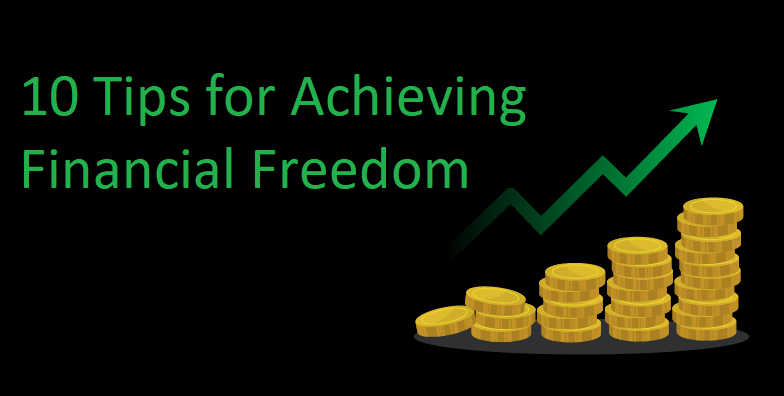Introduction
The journey to financial freedom is a common goal that people everywhere want to achieve. Whether you are walking through busy city streets or enjoying the quiet of the countryside, the wish to be financially independent is shared by many. In this guide, we will explore 10 tips of financial freedom that are easy to understand. These tips are meant to help you and others achieve financial independence.

10 Tips of Financial Freedom
1. Budgeting Bliss
Imagine budgeting as your personal financial guide, helping you navigate through your monthly expenses with ease. It’s about carefully planning how to spend your money on essential needs like rent and groceries, setting aside a portion for future goals like a retirement fund or an emergency savings account, and still having enough to enjoy life’s pleasures, such as dining out or hobbies.
A more detailed example could be the money you save by making small changes, like bringing lunch to work instead of eating out. If you spend $10 every day on lunch, that adds up to $50 a week or $200 a month. By preparing lunch at home, you could significantly reduce this expense, potentially saving hundreds of dollars each year that could go towards a vacation or paying off debt.
2. Emergency Fund Essentials
Think of an emergency fund as your financial safety net, ready to support you in times of unexpected events such as sudden car repairs or unexpected medical bills. Having this fund in place allows you to manage life’s surprises without falling into financial stress.
Aim to save at least three months’ worth of living expenses. This cushion provides a safety buffer against unforeseen circumstances. For example, if your monthly expenses total $3,000, then a good emergency fund would be at least $9,000. This amount can cover scenarios like job loss or significant home repairs, ensuring you can maintain your standard of living while addressing these challenges without needing to incur debt.
3. Savvy Savings Strategies
Consider utilizing tax-efficient savings accounts as part of your financial planning. Making regular contributions to these accounts is like giving small gifts to your future self, setting you up for greater financial security later on. Think of it as planting seeds now to enjoy a bountiful harvest in the future.
For example, if you start contributing to an Individual Retirement Account (IRA) or a 401(k), these investments grow tax-free or tax-deferred, meaning you don’t pay taxes on the earnings until you withdraw them, potentially at a lower tax rate in retirement. If you put away $200 a month in one of these accounts starting at age 30, by the time you retire at 65, you could have accumulated a significant amount due to compound interest and tax savings. This strategic approach ensures that your retirement will be more comfortable and financially secure.
4. Smart Investment Moves
Investing doesn’t have to be complicated. Think of it like planting seeds in your financial garden.
Choosing simple options like low-cost index funds can help your money grow steadily over time, similar to how a garden thrives with regular care. For example, if you invest a fixed amount into an index fund each month, you’re benefiting from what’s known as dollar-cost averaging, which can smooth out the peaks and valleys of market fluctuations. Over the years, this approach can lead to substantial growth, much like a well-tended garden that blossoms and expands season after season.
5. Debt Demolition
High-interest debts can significantly hinder your journey to financial freedom. It’s important to prioritize paying off debts with the highest interest rates first, as this strategy reduces the amount of money you waste on interest payments.
For example, suppose you have a credit card with a 20% annual interest rate carrying a balance of $5,000. By focusing on paying off this credit card as quickly as possible, instead of just making minimum payments, you could save hundreds or even thousands of dollars in interest charges over time. If you directed an extra $100 each month toward this debt, you would not only pay it off faster but also dramatically decrease the total interest paid, helping you free up funds for savings or other financial goals sooner.
6. Diversify Your Income for Financial Freedom
Viewing multiple income streams as financial insurance is a smart approach to achieving financial freedom. Exploring side gigs or investments beyond your primary source of income can provide additional security.
Diversifying your income means you are not overly dependent on one paycheck. This strategy ensures a more stable financial foundation, bringing you closer to the ultimate goal of financial freedom. For instance, you might have a main job, but taking on freelance projects, renting out a property, or investing in dividend-paying stocks can all serve as additional revenue streams. If your main job is affected by economic changes, these other sources can help maintain your overall income. For example, if you are a graphic designer by day, setting up an online shop selling digital templates can generate passive income that accumulates over time, further safeguarding your journey towards financial freedom.
7. Learn for Earnings and Financial Freedom
Continuous learning about personal finance is a powerful tool on your path to financial freedom. Stay informed by following financial news or listening to podcasts to make informed decisions.
Knowledge is your secret weapon in navigating the financial landscape. For example, educating yourself about investment strategies, budgeting techniques, or debt management can lead to better financial outcomes. Suppose you’re considering investing in a particular stock. By researching its performance, understanding market trends, and assessing your risk tolerance, you can make a more informed decision that aligns with your financial goals. Ultimately, the more you learn about personal finance, the better equipped you’ll be to achieve financial freedom.
For instance, understanding how compounding interest works can motivate you to start investing early, accelerating your journey towards financial independence.
8. Frugal Living Fun
Frugality isn’t about deprivation; it’s about making smart choices. Identify areas where you can cut costs without sacrificing too much.
For example, opting for generic brands or taking advantage of discounts can lead to significant savings. Let’s say you usually buy branded groceries, but switching to generic or store brands for certain items can result in noticeable savings over time. Similarly, keeping an eye out for sales, using coupons, or buying in bulk whenever possible can help stretch your dollars further without compromising on quality or enjoyment. By embracing frugality in these small ways, you can make your money work harder for you and bring yourself closer to financial freedom.
9. Regular Financial Check-ups
Think of your finances as a garden that requires care. Schedule regular check-ups to assess your progress and make adjustments to your goals.
Just as a gardener tends to plants, you need to tend to your financial goals. For instance, set aside time each month to review your budget, track your spending, and evaluate your savings and investment accounts. Are you on track to meet your financial goals? Are there any areas where you could cut back or reallocate funds to better align with your priorities? By conducting these regular check-ups, you can ensure that your financial garden continues to flourish and bring you closer to achieving financial freedom.
For example, if you notice that you’re consistently overspending in certain categories, like dining out or entertainment, you might decide to adjust your budget and allocate more funds towards savings or debt repayment. By conducting these regular check-ups, you can ensure that your financial garden continues to flourish and bring you closer to achieving financial freedom.
10. Retirement Readiness
Planning for retirement is an investment in your future self. Start early and take advantage of retirement savings options. It’s like planting a tree today that will provide shade for your future. Begin by utilizing employer-sponsored plans (like a 401(k) in the US) or government schemes (like an ISA in the UK).
Regular contributions ensure your retirement fund grows steadily. For instance, if you start contributing $200 per month to your retirement account at age 25 and continue until retirement at 65, assuming a 7% annual return, you could potentially accumulate over $500,000. This demonstrates the power of starting early and consistently contributing towards your retirement goals. By taking proactive steps now, you can enjoy financial security and peace of mind in your golden years.
Conclusion
In conclusion, achieving financial freedom is a journey, not a destination. By incorporating these simple and actionable tips into your financial routine, you’re laying the groundwork for a more secure and prosperous future. Remember, it’s not about how much money you make, but how well you manage and grow what you have. Embrace these principles, stay consistent, and watch your path to financial freedom unfold.
